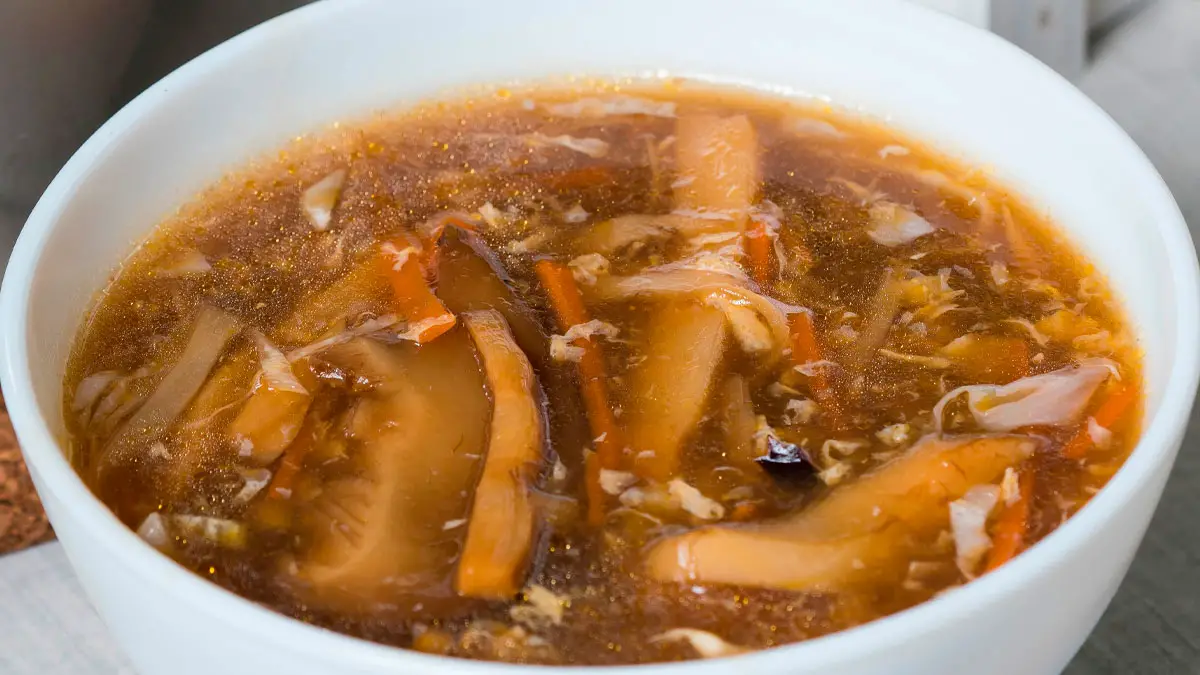This post may contain affiliate links. Please read my disclaimer.
Hot and sour soup is a flavorful Chinese dish perfect for a cold day. This tasty Chinese soup is an absolute favorite of mine, and I bet you’re a fan, too, if you’re here reading about it! But if you have gluten sensitivity or celiac disease, you might wonder if you can still enjoy hot and sour soup without worrying about gluten. Well, that’s what I’m here to talk about today!

What is Gluten?
First things first, let’s define gluten.
Gluten is a protein found in wheat, barley, and rye that is responsible for bread’s chewy texture and structural stability.
However, some people may experience digestive or other health problems when consuming gluten.
Ingredients in Hot and Sour Soup
Now that we’ve got that out of the way let’s talk about the ingredients in hot and sour soup.
The soup base of hot and sour soup is usually a rich chicken broth made with vinegar (like rice vinegar), soy sauce, and chili oil, which are all naturally gluten-free.
Some recipes include tomato paste or chili paste for extra flavor. The soup also often has tofu, bamboo shoots, wood ear mushrooms, and shiitake mushrooms.
However, some recipes call for adding a thickener, like cornstarch or wheat flour, to the broth. Some hot and sour soup recipes also call for adding beaten eggs or green onions to the broth.
Other common ingredients in hot and sour soup include white pepper, black pepper, and sesame oil.
These ingredients are all naturally gluten-free and can add delicious flavors and depth to the soup.
Does Hot and Sour Soup Have Gluten?
So, does hot and sour soup have gluten?
It all depends on the recipe and how it’s made! If the soup is made with a broth thickened with wheat flour or a roux, it will have gluten. But if the broth is thickened with cornstarch or another gluten-free ingredient, or if the soup doesn’t use a thickener, it can be gluten-free.
Some recipes also call for adding gluten-containing ingredients like soy sauce or oyster sauce. But, again, check the label or ask the chef if you’re concerned about gluten in the soup.
You May Also Like:
- How to Make Beef and Broccoli at Home (Better Than Takeout!)
- How to Make Ginger Scallion Sauce
- Easy Recipe for Hainanese Chicken Rice (in the Instant Pot!)
- Simple Chinese Tomato and Eggs
- How to Make Silky Chinese Steamed Eggs in the Instant Pot
Gluten-Free Options for Hot and Sour Soup
If You’re Cooking at Home
If you’re making the soup at home, you can use gluten-free flour or cornstarch as a thickener instead of wheat flour, or you can omit the thickener altogether and let the broth reduce until it reaches the desired thickness.
You can also use a cornstarch slurry to thicken the broth, which is made by mixing equal parts cornstarch and water.
Just be sure to use gluten-free soy sauce like tamari. Also, check the labels of any other sauces or seasonings you use to ensure they don’t contain gluten.
You can also make a vegetarian version or vegan version of hot and sour soup by using vegetable stock or water as the broth base and omitting any animal-based ingredients.
If You’re Eating Out
If you’re eating out at your favorite Chinese restaurant and want to order a gluten-free hot and sour soup, it’s always a good idea to ask the server or chef about the ingredients and preparation methods.
Some Chinese restaurants might have a gluten-free version of the soup available, or they might be able to modify the recipe to accommodate your dietary needs.
Just be aware that there is always a risk of cross-contamination in a restaurant kitchen, especially if the soup is prepared on the same equipment as gluten-containing foods.
If you have celiac disease, it might be safer to stick with a soup that you can prepare at home using gluten-free ingredients.

Nutrition Facts
Regarding nutrition, hot and sour soup is usually a low-calorie, low-fat option, especially if made with tofu and vegetables as the main ingredients.
A small bowl of hot and sour soup can provide a good source of protein, fiber, and various vitamins and minerals, depending on the ingredients used.
Tofu, bamboo shoots, wood ear mushrooms, and shiitake mushrooms are all good sources of nutrients and can add flavor and depth to the soup.
Storing and Reheating
If you have leftovers of hot and sour soup, you can store it in the fridge for 3-4 days or in the freezer for up to 3 months.
Just store it in an airtight container to keep it fresh.
When you’re ready to eat the soup, you can reheat it on the stove over medium heat or in the microwave.
You can add a little water or chicken stock to thin out the soup if it is too thick.
Frequently Asked Questions
Can I make hot and sour soup gluten-free?
Yes! You can make gluten-free hot and sour soup with gluten-free ingredients.
Be sure to use gluten-free flour or cornstarch as a thickener, omit the thickener altogether, and use gluten-free soy sauce or tamari.
You can also use a cornstarch slurry to thicken the broth, which is made by mixing equal parts cornstarch and water.
Is hot and sour soup vegan?
It depends on the recipe and the ingredients used. For example, some hot and sour soup recipes might use chicken or pork broth as the base, while others might use vegetable stock or water.
Some recipes also include tofu or other vegetarian protein sources, while others might use meat or seafood.
If you’re following a vegan diet, you can make a vegan version of hot and sour soup by using vegetable stock or water as the broth base and omitting animal products.
Add extra vegetables or protein sources like tofu or tempeh to the soup. And if you have a soy restriction, you can use coconut aminos instead of tamari as a soy sauce substitute.
Is hot and sour soup good for you?
In moderation, hot and sour soup can be a healthy and satisfying option. It’s usually low in calories and fat and can provide a good source of protein, fiber, and various vitamins and minerals, depending on the ingredients used.
However, the nutritional content of hot and sour soup can vary depending on the recipe and the ingredients used, so it’s always a good idea to check the labels or ask the chef if you have specific dietary needs.
Some hot and sour soup recipes might be high in sodium or sugar, so it’s important to be mindful of your overall dietary intake.
Can I eat hot and sour soup when I’m sick?
Some people find that hot and sour soup can help alleviate the symptoms of a cold or flu.
The spicy and flavorful broth can help clear congestion, and the hot temperature of the soup can help soothe a sore throat.
The vinegar and other ingredients in the soup might also have antibacterial properties that can help boost the immune system.
Can I eat hot and sour soup on a vegan diet?
Yes! You can eat hot and sour soup on a vegan diet as long as you choose a vegan version of the soup or modify a non-vegan recipe to fit your dietary needs.
Final Thoughts
I hope this blog post has helped you learn more about the presence of gluten in hot and sour soup and provided you with some ideas for gluten-free variations and alternatives to try.
Whether you’re a big fan of this classic Chinese dish or just looking for a tasty and satisfying gluten-free option, know there are plenty of ways to enjoy hot and sour soup!
Have you ever tried making hot and sour soup at home? What are your favorite ingredients to include in the broth? Share your recipes and tips with me in the comments below! I’d love to hear from you.
TIP: Pin this image below by hovering over it to save it to your Pinterest account and refer back to it later.


